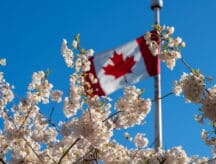Investing 101: How to Start Investing as a Newcomer in Canada

Moving to a new country brings many changes, including probably new ways to manage your financial goals. For newcomers to Canada, investing is one way to help grow your savings.
This article may help you understand what investing is, how to prepare, and some investment options available in Canada.
What Is Investing?[1] Your Path to Financial Growth
Investing involves putting your money into different investment products to potentially grow your wealth over time. This might mean buying assets like stocks, bonds, or mutual funds that may increase in value. In short, it’s a way for your money to work for you.
Learn more about TD New to Canada Banking Package
Why Invest?[1] Grow your money over time
Through investing, you can pursue the potential to earn higher long-term returns on your investment and a way to help your savings keep pace with inflation. Investing may also be a way to generate regular income, depending on the investment type, making it useful for both growth and income needs. One can also use investing to help save for major financial goals like retirement, home ownership, or your children's education.
What to Consider[2] Before You Invest
Before starting, you may wish to assess your personal situation. Here are some factors to consider:
- What’s Your Budget? Determine how much you can afford to invest. You don’t need a large amount to start—many investment products allow small contributions. Consider having an emergency fund and paying off any high-interest debt before investing.
- Set Your Financial Goals: What do you want to achieve? Are you saving to buy a home or finance your child's education? Your financial goals may help in shaping your investment strategy.
- Do You Have Investment Objectives? Decide what you want your money to do for you. Are you aiming for significant growth, steady income, or preserving your capital? Different investment products may help you better achieve these unique objectives.
- Determine Your Time Horizon: How long do you plan to invest? Shorter time frames may require more conservative options, while longer horizons might allow for higher-risk investments.
- How “Risk Tolerant” Are You? How comfortable are you with uncertainty? Different investments carry varying levels of risk. Higher-risk investments may offer higher potential returns but may also lead to potential losses. Understanding your comfort level with risk is key to making the right choices— and avoiding undue stress during market ups and downs.
Types of Investment Products Available
Financial service providers in Canada offer a range of investment products tailored to help you meet your financial goals, whether you're saving for buying a home, children’s education, retirement, or general wealth-building. Each product has unique benefits, so it’s good to understand what fits your financial needs.
Let’s explore some investing options available to you.
Registered Plans[3]: Tax Efficient Savings
Registered plans are government-approved savings accounts designed to help you save for specific financial goals, like retirement or education. Here are a few popular choices:
- Tax-Free Savings Account (TFSA): An investment option that lets you save and invest your money. You pay no tax on qualified investment income earned in your TFSA, and you can withdraw funds from a TFSA without paying tax on qualifying withdrawals. It may help you in reaching your financial goals like buying a car or home renovations and more.
- Registered Retirement Savings Plan (RRSP): RRSP is an option for long-term retirement savings. RRSP contributions are tax-deductible, and funds grow tax-deferred until withdrawn.
- Registered Education Savings Plan (RESP): This long-term savings plan helps you to save for a child’s post-secondary education. Eligible contributions grow tax-deferred. The Canadian government will match up to 20% of your eligible contributions through the Canada Education Savings Grant (CESG), up to $500 annually with a $7200 lifetime limit. Qualifying families may also be eligible for up to $2000 in Canada Learning Bond.
- First Home Savings Account (FHSA): An FHSA combines some of the features of an RRSP and TFSA. Eligible contributions will be tax-deductible, and qualifying withdrawals are not taxable.
Ready to bank? Learn more about TD New to Canada Banking Package today
Other Investment Products[3]: Flexible Options for Building Potential Wealth
Beyond the registered plans described above, these other investment products offer additional flexibility and diversity for your portfolio:
- Guaranteed Investment Certificate (GIC): A GIC is a secure way to grow your money since it offers 100% principal protection with a potential for a return on your investment. You choose the investment time frame, and at the end of the term, you receive your principal back along with any interest earned.
- Mutual Funds: These funds pool money from many investors to buy securities like bonds and stocks. It may be a good choice for investors seeking a professionally managed solution and greater portfolio diversification.
- Exchange-Traded Funds (ETFs): These are pooled investments similar to mutual funds, but they are traded on an exchange, like stocks, allowing for easier buying and selling.
- Stocks: Stocks represent a fractional percentage of ownership in the issuing corporation. As a shareholder, you can benefit from capital gains if shares increase in value and may receive periodic dividend payments.
- Bonds: These investments are issued by governments or corporations and pay you specified interest over time. Bonds differentiate themselves from stocks as they are debt investments, meaning the investor is lending money to the issuing corporation or government. Interest is paid over the life of the bond, typically semi-annually. At maturity you receive the final interest and the face value of the bond.
If you’re starting your investing journey in Canada, understanding the basics may help you pursue your financial goals. Whether using registered plans or other products, consider aligning your investments with your financial objectives, time horizon, and risk tolerance to stay on track. Remember, investing may be a long-term process—take your time, research, and consider seeking advice from financial professionals who understand newcomers’ goals.
Learn more about TD New to Canada Banking Package
Why Choose TD?
150 years helping Canadians:
TD has a proud history of delivering financial solutions to Canadians for more than 150 years. TD also brings a century of experience helping newcomers navigate the unique challenges of the Canadian banking system.
With over a thousand branches, a reputation for excellence in financial services, and the ability to also serve you in more than 80 different languages, TD has become one of the largest and most trusted banks in Canada, now serving 16 million Canadians.
TD offers online support and resources of interest to newcomers on topics such as banking basics, moving to Canada, credit score essentials, and more. TD is open longer hours for your convenience and has thousands of ATMs across Canada to help you take care of your everyday banking needs quickly and easily.
Ready to Bank?
Learn more about TD New to Canada Banking Package today. Book an appointment to talk with a TD Personal Banking Associate about the TD New to Canada Banking Package. You can book online right away, or visit the TD website to learn more.
Legal Disclaimer:
Information provided by TD Bank Group and other sources in this article is believed to be accurate and reliable when placed on this site, but we cannot guarantee it is accurate or complete or current at all times. Information in this article is for informational purposes only and is not intended to provide financial, legal, accounting, or tax advice and should not be relied upon in that regard. This information is not to be construed as a solicitation to buy. Products and services of the TD Bank Group are only offered in jurisdictions where they may be lawfully offered for sale. All products and services are subject to the terms of the applicable agreement. The information in this article is subject to change without notice.
TD Bank Group ("TD") means The Toronto-Dominion Bank and its affiliates, who provide deposit, investment, loan, securities, trust, insurance and other products or services.
TD Direct Investing is a division of TD Waterhouse Canada Inc., a subsidiary of The Toronto-Dominion Bank.
® The TD logo and other TD trademarks are the property of The Toronto-Dominion Bank or its subsidiaries.
[1] Saving vs. Investing: What's the difference? | TD Canada Trust, https://www.td.com/ca/en/personal-banking/personal-investing/learn/saving-vs-investing (Accessed 17-Oct-24)
[2] Investing 101: The Basics of Investing | TD Canada Trust, https://www.td.com/ca/en/personal-banking/personal-investing/learn/investing-101-basics (Accessed 17-Oct-24)
[3] Investing: A Step-by-Step Guide for Newcomers | TD Canada Trust, https://www.td.com/ca/en/personal-banking/solutions/new-to-canada/personal-investing-for-newcomers (Accessed 17-Oct-24)
- Do you need Canadian immigration assistance? Contact the Contact Cohen Immigration Law firm by completing our form
- Send us your feedback or your non-legal assistance questions by emailing us at media@canadavisa.com







